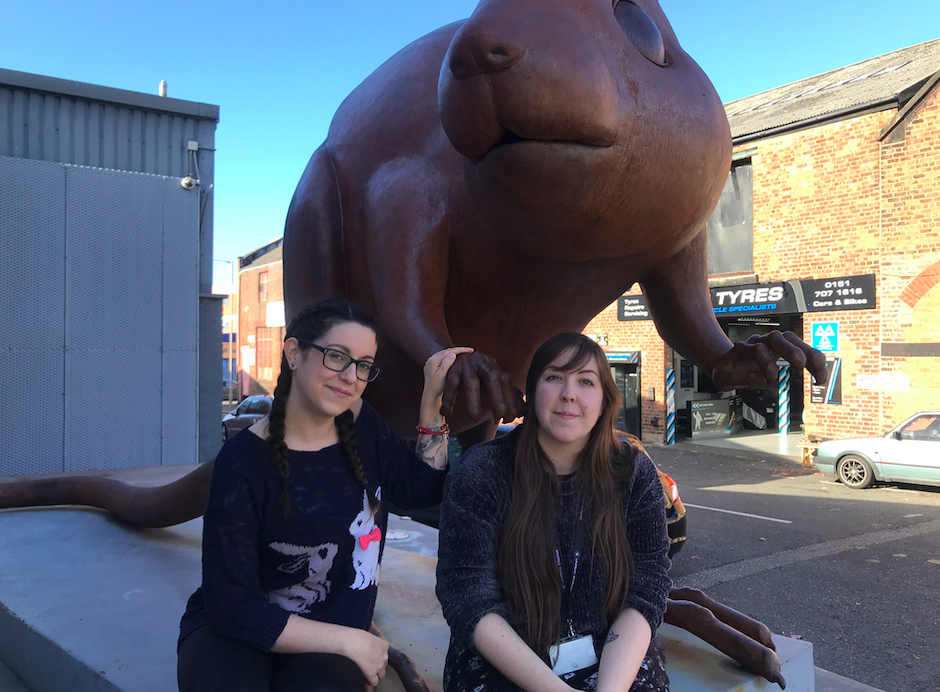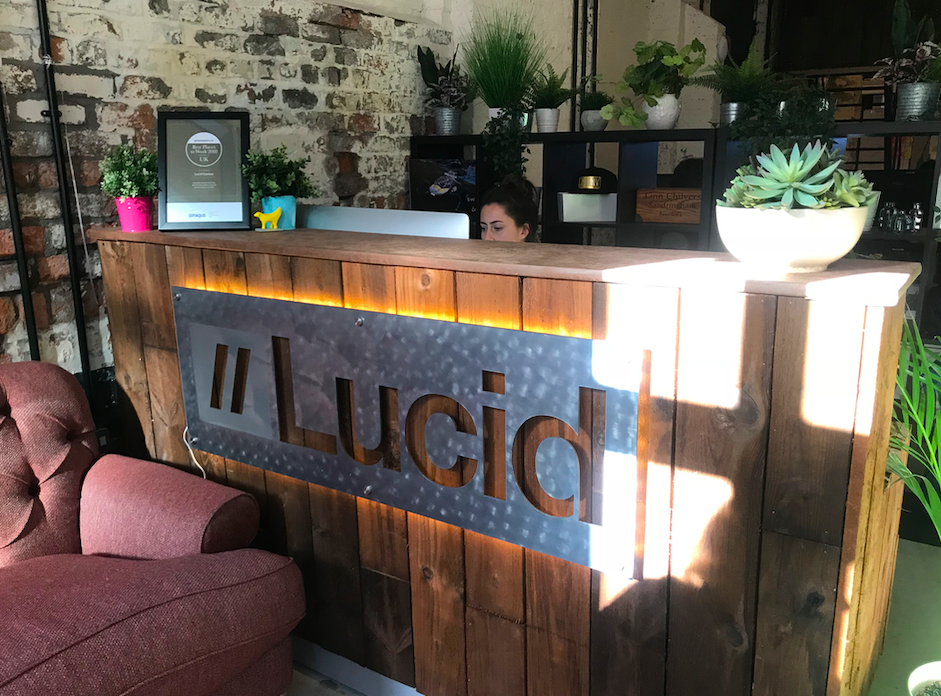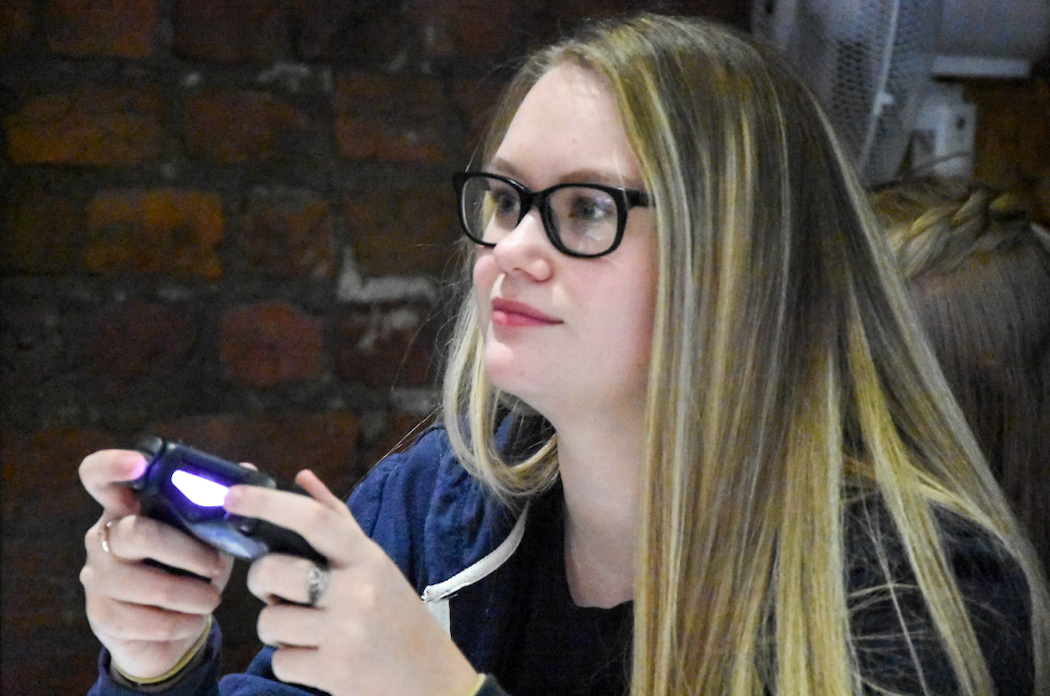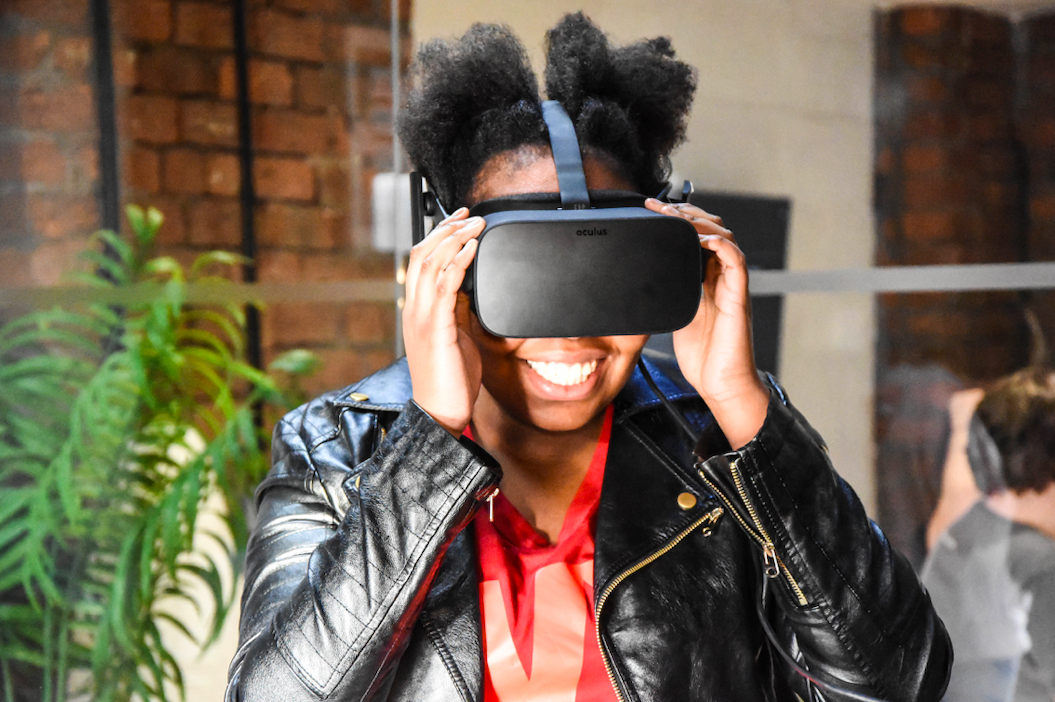Written by: on March 25, 2019
Our proud member, Lucid Games Ltd, is a cutting edge games and app development company with a studio in our neighbourhood, the Baltic Triangle. The team of over 100 have worked on notable titles like Switchblade, GTA: Liberty City Stories, Geometry Wars 3: Dimensions and Goat Simulator. They were also named as one of the best places to work in 2018 by gamesindustry.biz!

We spoke to two incredible women at Lucid Games, Amy, Producer and Nicola, Programmer, to find out what it’s like to work for Lucid and how they got to where they are today.
Amy – I loved BomberMan. I was an undefeated champion until I came to work at Lucid Games. I also loved driving and racing games when I was younger, like Need for Speed. Games like Monkey Island for the PC got me into click adventures which are my favourite type of games at the moment
Nicola – It depends on what mood I’m in. But the Diablo games series are great. I love dungeon crawlers and couch co-op games. If I’m on my own I love playing single player games like Assassin’s Creed and Tomb Raider. I still play Pokemon Go too.
Nicola – I’m a programmer here at Lucid. It does vary day-to-day, I can be doing system based tasks one day or more specific things that requires play testing and iteration another day. At the minute I’m working more on game play coding which means I’m working very closely with designers. The best way I’ve heard it be described is that the game designers are the architects and the programmers are the builders. It’s a very close relationship.
Amy – When the programmers have deadlines you can’t even go over and say hello to them because you could set them back an hour if you do. You need to let programmers get on with it and if they need anything they will come to you. It took me a long time to learn this.
Nicola – Yes! It’s like holding the map of the underground in your head and then trying to put all the connections in place whilst the picture is still there.
Amy – I work as a Producer. I work more closely with the artists and the publisher of the game, meeting their requirements. I also work with outsourcers who do a lot of the art and make sure we’re providing them with what they need and vice versa. I ensure that the whole team is aware of their tasks and I set up milestones for the content. I’m a bit like a shepherd in a way, if you give a games developer a year they will take a year to do it. But if you give them a month they will take a month. You need to give them a deadline otherwise we’d never release a game ever.
Amy – I had an older brother and sister so I grew up on the Atari and then we went onto PC and Playstation. Also, there were games that would help you revise on the BBC. Games just creep into your life in all different ways nowadays.
Nicola – I can’t remember the first time I picked up a game or started to play them. I can remember some of the first games I played like Spyro and the original Pokemon Games. But I don’t remember them not being around. I had a little brother too and when he was old enough that’s when I started to play couch co-op games because the two of us got on really well. The exact same way people would pick up a book, I would pick up a game to unwind and play a couple of hours/chapters. I played a lot of board games and card games as well.
Amy – I don’t know what it’s like now, but when I started working, working in gaming wasn’t an option. Even working in media wasn’t an option and that’s what I originally wanted to do so I went on to work in Radio. I did a couple of courses on gaming, web stuff and TV. When I worked in Radio, I also wanted to work in art but the option just wasn’t there and industry leaders were telling me that. I was very defeated so I kept working in Radio until the recession. I did a few other jobs at the time and got a phone call from somebody who had seen my profile on LinkedIn and was looking for a games producer. I was previously a Producer at the BBC so I had transferable skills. Instead of working on a project that would last for 30 secs/an hour I would be working on something that was going to be released years ahead. From there I stayed in the industry. I learnt to never be defeated and to just go for what you want to go for. I’m still working with art and audio but just differently.

Nicola – I came at it later than I would have liked to. I was good at science at school so they encouraged me to pursue biology. But I was visiting a friend of mine who was doing a computing course with games and I realised that this is what I wanted to do. I hadn’t done any coding before so it was a complete leap of faith. I am also very practically minded so I treat programming in that way.
This is why it’s so important for schools to start to expose their students to computing and programming earlier on so that they are aware of the opportunities earlier. Schools need to let students see their potential in programming earlier. I went on to do a four-year course in programming and gaming, whilst I was doing that I started to take part in outside competitions. If you rely solely on what they teach you at university you’re not going to get far. You need to apply what you’re learning and I’m grateful that my university pushed me to take part in these competitions. This builds up a portfolio which you can then use to get a job and that’s exactly how I got my job. I worked for an indie studio (independent studio – a small group of people using their own resources to develop games without working under any organisation) for a year and a half in Ireland before I came here, it was a real trial by fire and so helped me lose my training wheels. You wear so many different hats when you work at an indie because you’re working with such a small team.
Nicola – I don’t think of myself as a woman in tech, because I’ve never been made to feel different here at Lucid. I love working in tech and gaming because things are constantly changing and there’s always something to learn which is exciting. I love that I make games for a living. One of my most stressful days has been when I couldn’t get a creature to fart sparkles in a game and that was my bad day which is a hilarious thing to be stressed about, I laughed afterwards. Now if I’m actually stressing about something worth stressing about, I remind myself of that and put it in perspective.
Amy – If you find the right company to work for being a woman in gaming has its benefits because you’ve got a different outlook and opinion. The more diverse a company the better their games will be, because they will look at things from many different perspectives. The best thing about working in the industry in general is that you’re surrounded by creative people. There’s so many good ideas bouncing around and that just makes you a better individual too.
Amy – The role of a producer is so varied, it changes from one minute to the next. But that’s the thing I like about it because you learn so much on the job and that’s exciting. Everyday is different.
Nicola – Mine is definitely more structured and organised, all thanks to Amy’s job being more crazy. When I get in I check my task list, make sure I haven’t broken anything overnight and then it depends day-to-day. One day I might be working on a particularly big task that might take a couple of days or I might be working on something a bit smaller play testing it. Some days you’ve just purely got your head stuck in code and then other days you’re doing a lot of play testing and a lot of smaller tasks. I work way better in the morning so I’m normally in just before 8am. The office is really quiet at that time and I feel like I can think and get into my train of thought then. Because I’m in so early I leave at 4:30pm. Having that flexibility definitely helps in the games industry because there’s such a diverse skill set in the teams. It makes the most of your people if you let them work when they’re most productive.
Amy – It’s like a family here. We’re all really good friends.. We work well together because we respect each other, each other’s lives and backgrounds. You’re not a number you’re a person and you’re treated as such because we all care about each other. We just won one of the best companies to work for. We make sure that every new starter gets a really warm welcome, because we want them to stay. Lucid is the only place that I can see a future in. I don’t see working here as a stepping stone, I see it as the place where I want to have my career.
Nicola – Coming over from Ireland I did worry about not knowing anyone, but when I arrived it just wasn’t an issue. My second day here I was being invited out for coffees and going to social events. You spend the majority of your time at work and it makes such a difference when those people are your friends too. Other than the people and the atmosphere, the social conscience that Lucid has is something that I really admire. To get to work for a company that actually cares makes you feel proud. It’s different from most other workplaces I’ve worked in before. You want to grow with it and build it up because it’s something worth building up.
Nicola – The industry is sort of getting better, but there is a real visibility issue when it comes to women in gaming. When I was growing up I knew the games that I liked, I knew the companies that I liked but I didn’t know the people behind it, male or female. The first games developer I ever met was Brenda Romero but I barely knew who she was when I met her. Then I went away and googled her and was blown away by her and her career. But the fact that I didn’t know her and I related to her when I met her, encouraged me to start looking for other women behind the games.

There’s a conference I love to go to called Develop and Jade Raymond was doing a keynote there once, that was the first time I was really wowed by a big game developer. Her career is so inspiring, she’s such a boss. It would be nice if people like that were more visible for the younger generations so that they get that exposure earlier on. I’m quite a self-motivated person, I’ve never modelled myself off anyone but having people to look up to, I can’t see that as a bad thing.
Amy – When you go to networking events and you see women of all ages standing up and speaking about their experiences you realise that there are other women out there. I’ve only found these women to look up to by going out and finding them
Amy – I can see gaming going into different industries. We’re seeing it already, for example in the health industry. A lot of different places are taking on video games as a way of learning and treating people, like in medicine. With VR I can definitely see that going down that route rather than being a tool in gaming. I can potentially see VR having longevity in other industries.
Nicola – Gaming and games in general is becoming a lot more mainstream, which is why it’s being adopted by other industries. Pure gaming has become a hobby for a more diverse array of people, my mum and grandma even play games now. It’s becoming a much more acceptable past-time. It’s mainstream entertainment now, that stereotype of gamers being dudes locked away in bedrooms just isn’t true. People are playing games all the time now, on their phones etc. When I was younger I never felt games were being marketed towards me but there is a shift i can see , they are more visibly being marketed towards girls now too.
Amy – I think that’s great, because this had resulted in the industry frowning upon the sexualisation of women in games more.
Nicola – Games are also veering more towards storytelling, we’re getting better at it. There’s more narrative games now and even narrative-lite games have a real story within them. The rise of cross-platform gaming that allows you to play with your friends even if you don’t have the same console is also really exciting. I hope that continues because it brings about more connective game play.
Amy – Networking is so important. Also, self-publish your own games. We have access to so many tools online now that allow you to do this. If you want to go into programming for example, you don’t need to have a polished game. The industry professionals will see the potential in what you’re showing them. How you get to these places is through game jams and competitions. If they’re not put on your doorstep go and find them. There’s no reason why you can’t do it. If you’re an artist or developer, get a portfolio together. Get the experience yourself, don’t wait for someone else to give it to you. Take screenshots of your favourite games and modify them.

Nicola – Just start designing/ making your own games, I even know a few people who have got into gaming by modifying games (games that put themselves out there to be modified). And don’t count yourself out, I nearly didn’t apply for this job because I didn’t think I had everything for it, but over the last few years I’ve got into the habit of saying to myself ‘what’s the worst thing that can happen?’ The worst thing they could do is ignore you and that doesn’t directly affect you anyway. As women we have a bad tendency to apply for jobs less when we don’t feel we meet all the requirements. But we need to just go for it, put yourself out there. Don’t be afraid to get in contact with games companies too, email and ask them questions about how they got into it.
Amy – If you think you need to acquire more skills, get as many transferable skills as possible. Volunteering is a great way to do that. Do what you enjoy too. You might think that you want to work in gaming but you’re not sure which area you want to go into, be open and don’t work yourself into a corner. It’s such a worthwhile industry to work in, it’s hard work but it’s worth it. You don’t work a day in your life if you’re doing something you enjoy.
April 22, 2024 - Lauren